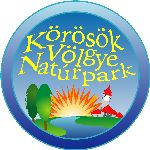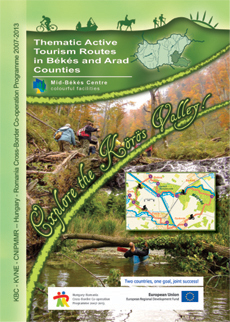| BÉKÉS (22,000 inhabitants) lies on left bank of the Double-Körös River, 10 kilometers from Békéscsaba. The town is well known for its sports and touristic attractions.
People interested in water tours, riding tours, bicycle tours and also who like fishing and hunting can find various program, as well as those who prefer relaxation and rest. The Békés-Tarhos Music Festival is festival several weeks long, and brings musical programs
of all kinds for the music lovers. The Madzagfalvi Days is a three day regional entertaining program carrying local traditions and amusement for families. All major events of the program are linked to some kind of local historical fact. Békés is the center of its own microregion.
The town is one of the incorporators of the Körösök Völgye Natúrpark Association. It is also taking part in the activity of the Middle Békés Association of Municipalities for Regional Development. Békés has developed dynamically in the last decades, but preserved its provincial, peaceful atmosphere. The town is attractive for its untainted natural resources. Many buildings preserved the folk architect traditions and one is operating as a country museum since 1970. A valuable local ancient monument is the Greek Orthodox Church, founded by Greek merchants in the XVIII Century. The late Rococo furnishings and the iconostasis were maid in 1795. Framed by gilded foliage and palmette, the icons are outstandingly valuable.
The thermal water found under the city was certified as healing water as early as 1943 and the local spa provides various cures for many health conditions. Békés owes part of its reputation to its handcrafted baskets, a complete local industry in the microregion, to
which the willow-plantations along the Körös Rivers supply the necessary raw material.
The growing of hemp and flaxen and the processing of their fibres was significant in the peasantry of Békés’ life on centuries. They also made many kinds of rope and string (‘madzag’) as by-products of hemp processing. This is the reason why Békés is called
Madzagfalva.
The Railway History Park is a unique scenic spot in the town, which is established from the more than 100 year old distillery locomotive engine and wagons. We can taste the Hungaricum declared Békési Szilvapálinka on the premises. This is a proprietary
product, which is made from red plum with century old traditional home distilling technique.
Thanks to the wood barrel aging, it casts a spell upon anyone who takes a sip of this noble drink with its golden shining colour and pleasant, mild vanilla taste.
www.bekes.hu
| |
| BÉKÉSCSABA (66,000 inhabitants) is situated in the middle of the Great Plain and is the capital town of county Békés, and also the center of the small region. Békéscsaba has been a town of county rank since 1990, and the center of the county’s transport,
commercial, processing industries, cultural and educational life. As regards tourism, the town is famous for its cultural and gastronomical programs.
The cultural life of the town is remarkably rich, due to the many nationalities present in the area. The traditions the Romanian, the Slovak, the Polish, the Gypsy and of course the Hungarian communities live on to date. The town’s rich architectural heritage
with its ancient monuments, the unique thermal bath, the surrounding sports facilities (equestrian events, rowing, touring, sailing and trick-flying) make Békéscsaba a great place for tourism. The Csaba Sausage Festival held in each October grew into one of
Hungary’s largest gastronomic festivals. The Csaba Beer and Hoof Festival, the Townhall Nights are performed each year. The High Street of downtown Békéscsaba is the Andrássy Road, isolated from the traffic in the town center, with its evocative pedestrian
zone, and the Fresh Water canal, cutting through the town.
Along the channelbank one can find places that commemorate the famous people born in Békéscsaba or who spent some periods of their lives in the town. There is also the Statue walkway with the monuments of famous personalities with splendid buildings
like the Evangelical Church, the Munkácsy Mihály Museum, the Hotel Fiume, the Pápuai Szent Antal Roman Catholic Parish and the Jesus’ Heart Roman Catholic Church. The classicist style Evangelical Church is also a symbol of the town. This church is the largest evangelical church in Central Europe, with its capacity of 6000 people and its 72 meter tower. The Town Hall was built in romantic style. Its facade was designed by Miklós Ybl. The Jókai Theatre and the aforementioned Hotel Fiume recall the civilian milieu of the 19th century. The Slovak nationality estate of the decedent is preserved in the House of Slovakian Traditions.
The famous painter Mihály Munkácsy spent his childhood in Békéscsaba. The Museum bears his name, where history and show-places of the county are presented. Nine original paintings and seven sketches, as well as more than 400 valuable relics are preserved there, all connected to the artist. This collection is remarkable and unique in all aspects. The Museum provides special opportunities, for example craftsman workshops, reading presentations, terminals with information, special history and drawing lessons, an enormous aquarium with rare and protected species of river fish. The first three-dimensional nature film of the country is also available here. Another show-place of the town is the former Steiner-Omaszta Cottage. Today named as Munkácsy Memory
House, it is also an exhibition site for the painter’s works.
www.bekescsaba.hu | |
| GYULA (33,000 inhabitants) is a small town on the south-east part of the Great Hungarian Plain, on the left bank of White-Körös, directly on the Hungarian-Romanian border. It is an outstanding destination, the undisputed touristic center of the entire Békés County. The town is renowned for its Gothic style, brick-built castle, the last plain brick castle standing to date.
The residential parts and the chapel is in sound condition, and forms the heart of the town’s historical downtown area. Today exhibitions take place in the Castle, where the history and every day life of the middle ages are presented together with a fascinating weapon exhibition.
In summer, the Castle hosts the well-known Castle Theatre and plays are performed in and out of the castle walls alike. The theatrical festival starts in July and lasts throughout the summer. The first performance took place in in 1964, in order to make use of the excellent acoustic conditions within the closed court of the Castle. Other notable monuments are the Orthodox Szent Miklós Cathedral, the Franciscan garden with ancient ruins, as well as the former County Hall, the Ladics-house and Ferenc Erkel’s birthplace. Outstanding showplace of Gyula is the Centenary Confectionery, which was set up in 1840 by his first owner,
András Salis. The furniture are renovated for today, more saloons are arranged and the freechimney confectioner museum was established.
The one and a half century old corner hall of the confectionery remained unchanged since its first opening. Two saloons were also arranged with Biedermeier furniture presenting the original setting. In the lobby there is a small exhibition of the old patisserie
tools. The famous Gyula sausage, a gastronomic specialty of the town, was developed by local butchers in the beginning of the 20th century. The population of the town started growing after the Turks left the country and Romanian and German nationalities moved
in to the Hungarian-speaking town. Since then Gyula has had a blooming multinational cultural life, and is the center of the Romanian nationality in Hungary. Being one of the most important holiday resorts in East Hungary, the town is an ideal
place for rest with its pleasant climate, shaded parks and the legendary Castle Spa, situated in the ancient park of the Almássy Chateau, the residence of László Almássy (‘The English Patient’). The outdoor territory of the Spa is a nature protected area. The newly developed Castle Spa will be the most modern, European quality level spa and open-air bath in the South-Great Plain. With its 19 pools the Spa is a four-star lido and thermal spa qualified by the Hungarian Spa Association. The Minister of the Health declared the 72 Celsius degree water of the Castle Spa, stemming from the depth of 2005 meters as healing water in 1969. The guests who seek healing therapies and treatments may choose from a large scale of medical and pleasure pools, as well as swimming pools, and medical cures and massages.
www.gyula.hu
| |
|





